Grant supports K-State hotline for diagnosing toxic animal emergencies
Hotline to help livestock veterinarians to recognize, address toxicology problems in food animal species.
September 30, 2021

Rapid response to animal health emergencies has prompted the creation of a new veterinary toxicology training program at Kansas State University. A $248,000 U.S. Department of Agriculture grant will enhance the ability of researchers in the College of Veterinary Medicine to answer calls for help.
The goal of the program, developed by Steve Ensley, clinical veterinary toxicologist, and Bob Larson, professor of production medicine, is to create impactful and innovative outreach tools. This will better enable livestock veterinarians to recognize and address toxicology problems in food animal species, especially cattle, small ruminants and pigs.
This project will utilize veterinary telemedicine and other distance-based education resources, including a toxicology call-in hotline for practicing veterinarians called CONSULT — Collaborative, Online, Novel, Science-based, User-friendly, Learning Tool — for common livestock toxicology problems, and YouTube training videos.
The nationwide call-in service to address common food animal toxicological emergencies was identified as a priority by the researchers.
"The toxicology section at the Kansas State Veterinary Diagnostic Lab and I receive multiple calls each day dealing with questions about food animal veterinary toxicology from across the U.S.," Ensley said. "Many questions are about current cases that veterinarians are dealing with and they want assistance in answering specific questions. Because of the infrequent nature of most toxicological case presentations, many practicing veterinarians find it difficult to maintain the current knowledge necessary to quickly address specific toxicological emergencies."
The outreach portals created with the grant provide new and valuable resources to practitioners.
"This program will greatly enhance currently available toxicology resources for teaching veterinary nurses and veterinary students during the last two years of their professional education," Larson said.
Some of the resources can be modified to be content-appropriate to introduce important animal health concepts to high school students in grades 11 and 12, he said.
Outreach portals for the training materials will include the websites for the Beef Cattle Institute, Kansas State Veterinary Diagnostic Laboratory, K-State Veterinary Medical Continuing Education and the Colby Community College veterinary nursing program.
You May Also Like



